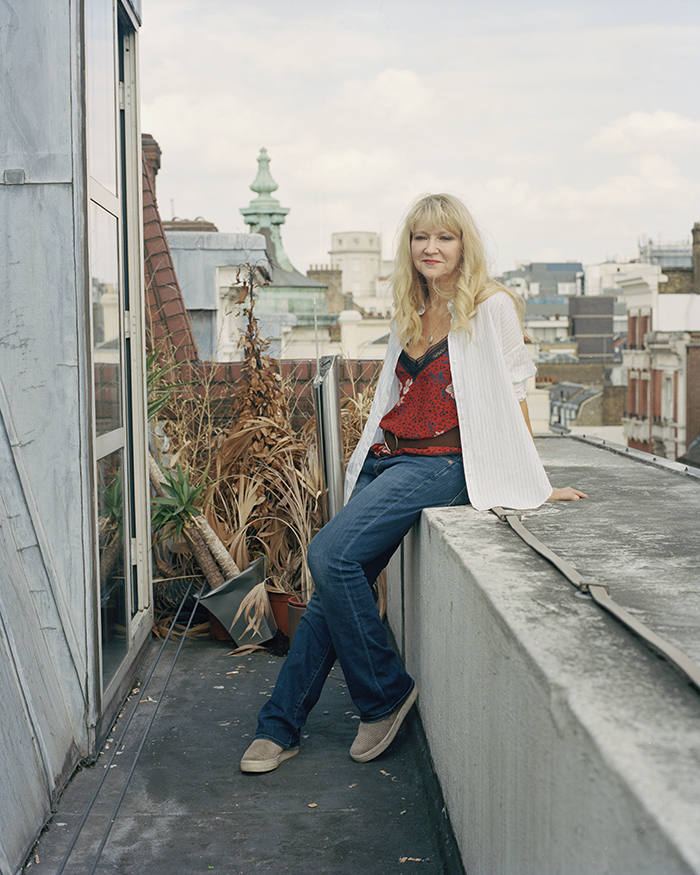 The UK Theatre Awards, presented earlier today at the Guildhall, have been the UK’s only national theatre awards rewarding productions through the entirety of the British theatre of member theatres of the trade organisation, for the last 28 years (they were founded in 1991). I’ve been a judge for the last four or five years — I can’t remember when I joined! — and of course there’s absolutely no way for any single judge to have possibly covered every single eligible production in a member theatre. So even though it is a somewhat inexact science, inevitably, to come up with the list of the best productions we’ve collectively seen as a judging panel across the year, a kind of consensus emerges between us, as we champion our own suggestions and the rest of the panel is carried, or not, by the strength and conviction with which we each make our cases.
The UK Theatre Awards, presented earlier today at the Guildhall, have been the UK’s only national theatre awards rewarding productions through the entirety of the British theatre of member theatres of the trade organisation, for the last 28 years (they were founded in 1991). I’ve been a judge for the last four or five years — I can’t remember when I joined! — and of course there’s absolutely no way for any single judge to have possibly covered every single eligible production in a member theatre. So even though it is a somewhat inexact science, inevitably, to come up with the list of the best productions we’ve collectively seen as a judging panel across the year, a kind of consensus emerges between us, as we champion our own suggestions and the rest of the panel is carried, or not, by the strength and conviction with which we each make our cases.
But at today’s UK Theatre Awards it was revealed that the methodology will be changing going forward, with member theatres themselves invited to propose their own shows for shortlisting. The suggestion is that these are made sparingly, for exceptional work only. But getting theatres to objectively view their own output may be a different kind of challenge.
The more important intervention would be to find a way of ensuring that more judges see more of the work. And, given that the work is national, we need to get to more regional theatres to do so. This entails both time and travel — and in turn expense — if it is to be done properly.
The results of this year’s awards are here. With four wins in the competitive categories originating at Manchester’s Royal Exchange, and one more for outstanding contribution to British theatre awarded to Maxine Peake whose ‘home theatre’ is very much the Exchange, it had a particularly good showing, with other awards including ones to its artistic director Sarah Frankcom, named Best Director for Our Town, Kendall Feaver’s The Almighty Sometimes named Best New Play, a new contemporary version of Chekhov’s Three Sisters, co-produced with RashDash, anointed best touring production and Ashley Zhangazha winning Best performance in a musical for his performance as Nathan Detroit in the revival last Christmas of Guys and Dolls, co-produced with Talawa Theatre Company,
It was also good to see Theatr Clwyd from Mold in North Wales, Cardiff’s Sherman Theatre. Nottingham Playhouse and Bolton’s Octagon (in a co-production with London’s Royal Court and Out of Joint) variously represented.
LONDON OPENINGS OF THE WEEK
* It was a week of three, radically overhauled and condensed Shakespeares: Twelfth Night turned into a community musical (or moosical, as I saw the at the Young Vic (or “a banging moosical”, as I saw the National Theatre dramaturg Stewart Pringle mysteriously dub it on Twitter); othellomacbeth at Lyric Hammersmith, a mash-up of Othello and Macbeth by director Jude Christian; and Measure for Measure at the Donmar Warehouse, with an edited version of the play run twice — first set in 1604, then in 2018, but with the roles of the protagonists reversed: first it is Angelo exploiting the religious novice Isabella, then in the second half re-run it is Angelo who becomes Isabella’s sexual victim.
Twelfth Night — Young Vic, opening October 7
Kwame Kwei-Armah launched his tenure as artistic director at the Young Vic with a re-worked version of a Shakespeare play, updated with new songs and heavily edited, that he’d previously co-directed with Oskar Eustis of New York Public Theatre for that company’s Central Park summer season.
As Maxie Szalwinska states in a three-star review for the Sunday Times, “Even those who cheered the appointment of Kwame Kwei-Armah will admit that he has a hard act to follow, as David Lan’s programming had an uncommon breadth of imagination. This isn’t the boldest start — a Londonised revival of Shaina Taub’s musical adaptation of Twelfth Night, already seen at New York’s Shakespeare in the Park — but its sheer good nature goes a long way.”
In Time Out, Andzrej Lukowski also nails the evening’s sense of fun and the spirit of goodwill it engenders: “There is a tremendous amount of goodwill out there for Kwei-Armah and this joyous musical almost feels like a manifestation of that – a living firework celebrating the homecoming of Britain’s most prominent black artistic director. There is harder stuff programmed for later in the season. For now, let’s party.”
 Susannah Clapp, writing in The Observer, says that “Kwame Kwei-Armah’s first production as artistic director of the cherished Young Vic is a direct shot to the heart”, and says of the director’s wider aspirations: “Kwei-Armah has eschewed the idea of a right-on agenda, but he is helping to change the theatre: making it less totally white, male and young-loving. That is political and it is admirable.” She also writes of Gerard Carey’s Malvolio (pictured right) that it is “one of the best performances of the year: an inflatable canary in banana-coloured Lycra who calls on his mummy as he mourns the difficulty of being truly great.”
Susannah Clapp, writing in The Observer, says that “Kwame Kwei-Armah’s first production as artistic director of the cherished Young Vic is a direct shot to the heart”, and says of the director’s wider aspirations: “Kwei-Armah has eschewed the idea of a right-on agenda, but he is helping to change the theatre: making it less totally white, male and young-loving. That is political and it is admirable.” She also writes of Gerard Carey’s Malvolio (pictured right) that it is “one of the best performances of the year: an inflatable canary in banana-coloured Lycra who calls on his mummy as he mourns the difficulty of being truly great.”
In the Daily Mail, Patrick Marmion agrees on Gerard Carey, calling him “the best Malvolio I’ve ever seen. He has a ball, mincing about in monogrammed slippers and dressing gown, before floating disdainfully on an electric hoverboard.”
othellomacbeth — Lyric Hammersmith, opening on October 10:
In a two-star review for the Evening Standard, Fiona Mountford wrote: “This project perplexes me. Has anyone really been longing to see stripped-down 70-minute versions of two of Shakespeare’s most famous tragedies, performed by an ensemble of nine? Anyone who doesn’t already know these plays well will be bewildered; the audience members behind me spoke of their confusion. In short, this looks like a tiresomely modish conceit; the hope was that director Jude Christian would redeem it by illuminating some startling links between the two texts. On the whole she doesn’t and the focus of both plays is now oddly skewed and their gravitas diminished. ”
In The Times, Chris Bennion agrees: “It is muddled. As a theatrical Frankenstein’s monster, it intrigues, but this Shakespearean mash-up only fleetingly comes to life.”
Measure for Measure — Donmar Warehouse, opening on October 11:
 In The Guardian, Michael Billington writes: “There are no half measures in Josie Rourke’s production of Shakespeare’s perennially topical play. In fact, we get the text, artfully cut, twice…. Even if the focus is more on Viennese high-life than low-life, in the first half Rourke plausibly creates a hierarchical, religious world; one notices the detail by which Angelo is given temporary charge of the city in preference to his senior colleague, Escalus…. What if the roles were reversed? That is the question posed in the second half, when Atwell’s Isabella is in government and Lowden’s Angelo is her prey. The problem is that the situation doesn’t make much sense…. Rourke’s argument presumably is that power corrupts, irrespective of gender…. While the evening is ingenious and (Hayley) Atwell and (Jack) Lowden give strong performances, the production suggests that you don’t need a double Measure to reinforce the text’s relevance.”
In The Guardian, Michael Billington writes: “There are no half measures in Josie Rourke’s production of Shakespeare’s perennially topical play. In fact, we get the text, artfully cut, twice…. Even if the focus is more on Viennese high-life than low-life, in the first half Rourke plausibly creates a hierarchical, religious world; one notices the detail by which Angelo is given temporary charge of the city in preference to his senior colleague, Escalus…. What if the roles were reversed? That is the question posed in the second half, when Atwell’s Isabella is in government and Lowden’s Angelo is her prey. The problem is that the situation doesn’t make much sense…. Rourke’s argument presumably is that power corrupts, irrespective of gender…. While the evening is ingenious and (Hayley) Atwell and (Jack) Lowden give strong performances, the production suggests that you don’t need a double Measure to reinforce the text’s relevance.”
In The Stage, Natasha Tripney writes, “It’s a really slick production, handsomely designed by Peter McKintosh and well acted, but the first run-though of the play, whittled down to its essentials, is more satisfying than the attempt to update it. Though thought-provoking it seems confused in what it wants to say about women, power and justice – but then things are confusing at the moment.”
For Ann Treneman in The Times, “This is not so much a play as a project and it feels as if Josie Rourke, the outgoing artistic director of the Donmar, has been thinking about it for far too long…. It is all a bit like a college thesis gone rogue in the Me Too era.”
* Mythic — Charing Cross Theatre, opening October 8
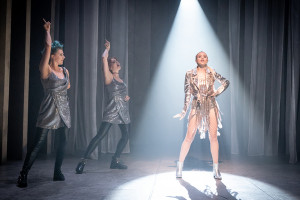 A new American-born musical by Marcus Stevens (book and lyrics) and Oran Eldor (music) made its London debut at Charing Cross Theatre, not exactly a theatre with a strong pedigree in launching new musicals (as opposed to revivals, which it has done successfully). But in The Stage, Tim Bano wrote,” It’s a strange concept. Genevieve McCarthy’s Aphrodite, goddess of love, becomes a glittery Kardashian-esque celeb while Michael Mather’s Hades is an introspective, self-loathing emo. But somehow it works. Really well, in fact. The whole show, like the catchy verse-chorus pop songs it’s made up of, is incredibly tightly written….. Everything is well judged. Everything works. From Sarah O’Gleby’s just-lively-enough direction and choreography to the set, the lights, the score, the band. From the top of Olympus to the depths of Hades. It’s heavenly.”
A new American-born musical by Marcus Stevens (book and lyrics) and Oran Eldor (music) made its London debut at Charing Cross Theatre, not exactly a theatre with a strong pedigree in launching new musicals (as opposed to revivals, which it has done successfully). But in The Stage, Tim Bano wrote,” It’s a strange concept. Genevieve McCarthy’s Aphrodite, goddess of love, becomes a glittery Kardashian-esque celeb while Michael Mather’s Hades is an introspective, self-loathing emo. But somehow it works. Really well, in fact. The whole show, like the catchy verse-chorus pop songs it’s made up of, is incredibly tightly written….. Everything is well judged. Everything works. From Sarah O’Gleby’s just-lively-enough direction and choreography to the set, the lights, the score, the band. From the top of Olympus to the depths of Hades. It’s heavenly.”
* In the Height of the Storm — Wyndham’s Theatre and I’m Not Running — National’s Lyttelton Theatre, both opening October 9:
There were also two openings on the same night on October 9: a West End opening for Florian Zeller’s latest The Height of the Storm (at Wyndham’s, which previously housed transfers for his plays The Father from Bath Theatre Royal’s Ustinov and The Truth from the Menier), and the premiere of David Hare’s latest original play — his 17th — for the National Theatre, this time in the Lyttelton.
Writing in The Guardian, Michael Billington says of the writer of In the Height of the Storm, “The one sure fact about a play by Florian Zeller is that nothing is ever certain. Whereas in his plays about adultery, The Truth and The Lie,, this led to a labyrinthine tricksiness, his latest piece is more like The Father in that it puzzles the brain while touching the heart… It offers a deeply moving study of love, loss and the unbearable pain of absence.”
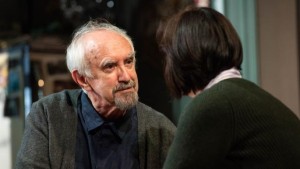 And in The Observer, Susannah Clapp brilliantly (and eloquently) points out, “Florian Zeller likes to shiver the stage with uncertainty. Well, his mother used to read the tarot. Zeller lays out his cards and leaves the audience to make the connections. That is not always easy. I entered The Height of the Storm (finely, which is to say, invisibly translated by Christopher Hampton) thinking the real thrill would be seeing two of the most gifted and subtle actors currently at work. That was right but limited. Because the generous brilliance of Eileen Atkins and Jonathan Pryce (right) is that they draw an audience not towards themselves, but into what they are doing: making it look as if they are simply flesh on an essential skeleton.”
And in The Observer, Susannah Clapp brilliantly (and eloquently) points out, “Florian Zeller likes to shiver the stage with uncertainty. Well, his mother used to read the tarot. Zeller lays out his cards and leaves the audience to make the connections. That is not always easy. I entered The Height of the Storm (finely, which is to say, invisibly translated by Christopher Hampton) thinking the real thrill would be seeing two of the most gifted and subtle actors currently at work. That was right but limited. Because the generous brilliance of Eileen Atkins and Jonathan Pryce (right) is that they draw an audience not towards themselves, but into what they are doing: making it look as if they are simply flesh on an essential skeleton.”
In The Times, Dominic Maxwell dubs it “this artfully confusing, always absorbing, darkly amusing and finally deeply moving new play by Florian Zeller”, and says of Jonathan Pryce, “It is a stunning performance in a play that takes us to the edge of what it is to love someone, to depend on someone, to contemplate life (or death) without them. [Eileen] Atkins excels as the still-coping, still-acerbic, strikingly flesh-and-blood Madeleine. So hushed discussion fills the auditorium during scene changes: what are the rules here? All becomes heartbreakingly clear by the end of an 80-minute show that packs in more human life than many shows manage in three hours.”
 Writing of David Hare’s play, that goes behind-the-scenes of a leadership struggle in the Labour Party, David Jays in the Sunday Times says: “In our what-fresh-hell-is-this? news cycle, David Hare’s play — his 17th to premiere at the National — feels oddly uncurrent. His story of a Westminster outsider who swivels around the idea of political ambition mostly unfolds in a notional 2018 — one without Brexit, Corbyn or the toxic ideological fracturing between and within parties. Oh happy days, when we weren’t fearfully stockpiling tinned meats and anticipating apocalypse. As a result, it seems backdated and inconsequential.”
Writing of David Hare’s play, that goes behind-the-scenes of a leadership struggle in the Labour Party, David Jays in the Sunday Times says: “In our what-fresh-hell-is-this? news cycle, David Hare’s play — his 17th to premiere at the National — feels oddly uncurrent. His story of a Westminster outsider who swivels around the idea of political ambition mostly unfolds in a notional 2018 — one without Brexit, Corbyn or the toxic ideological fracturing between and within parties. Oh happy days, when we weren’t fearfully stockpiling tinned meats and anticipating apocalypse. As a result, it seems backdated and inconsequential.”
In a one-star review for Time Out, Alice Savile is even more acerbic, writing, “There are many lowlights, but a monologue where Pauline describes, with not a trace of humour, the transformative effects of watching two doves having sex is a particular nadir. Siân Brooke has her work cut out with this bizarrely written central role, and her strange intonations don’t exactly sell Pauline as a genuine human, let alone a beloved woman of the people…. James Graham recently nailed pretty similar territory in Labour of Love. That doesn’t mean other playwrights shouldn’t have a go. But this play feels less like labour, more like hard work.”
* 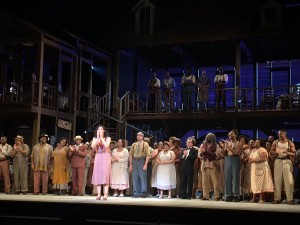 Porgy and Bess — London Coliseum, opening on October 11
Porgy and Bess — London Coliseum, opening on October 11
English National Opera stages its first production of Gershwin’s great folk opera, first seen on Broadway in 1937 but these days more at home on opera stages, which can marshal the right number of actors and voices (here, there 23 named characters, plus a chorus of over 40, plus six additional actors and eight additional kids, pictured in the curtain call right).
In The Times, Richard Morrison writes, “By far the biggest thrills in this new English National Opera production are when the specially recruited chorus hurl out these gloriously sonorous affirmations of Christian faith. It’s like the best gospel choir you’ve ever heard… And the second most thrilling thing about ENO’s staging is the quality of the solo singing from this ensemble. It’s as if a whole generation of black singers, drawn from Africa and America as well as the UK, are collectively seizing a (still shamefully rare) chance to shine in a leading opera house.”
In the Independent, Michael Church is likewise full of praise for the chorus: “The chief marvel of this production lies in the mostly black chorus. Drawn from America, South Africa, and New Zealand, this comes together as a community in which every member has an allotted role, but Robinson’s direction has them playing together seamlessly, with even the children being without a shred of self-conscious stagyness. Latonia Moore’s religious Serena and Tichina Vaughn’s feisty Maria are just two of the characters who intermittently surge out in bold relief. And when the chorus sings full-blast – as in the climactic rendering of ‘It ain’t necessarily so’ – the effect is electrifying. The fights, the murder, the funeral, the prayer-meetings – everything is hyper-real.”
NEW YORK OPENING OF THE WEEK
* Oklahoma! – St Ann’s Warehouse, opening October 7
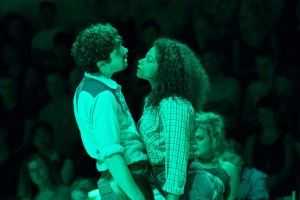 This production of the Rodgers and Hammerstein classic was first seen at Bard College in Annandale-on-Hudson in July 2015, when Ben Brantley wrote in the New York Times, “It’s a brash, fresh wind that’s sweepin’ down the plain of Oklahoma! these days, the kind that dispels mists and must. Daniel Fish’s vibrant, essential excavation of Rodgers and Hammerstein’s 1943 classic asks that we listen with virgin ears to the show that changed the course of the Broadway musical.”
For the show’s transfer to Off-Broadway’s St Ann’s Warehouse, Brantley was joined by joint lead critic Jesse Green for a joint review that was written as a conversation between them. In it, Green says: “Scott Zielinski’s lighting design goes from blindingly bright, as one imagines the prairie sun to be, to dead dark, the kind that exists in the unhappiest human hearts. Both are revealed to be part of this story that for a long time has offered only midlevel Broadway glitz.” To which Brantley replies, “Very true. Mr. Fish is providing a stark illumination that allows those homesteaders we once thought were so wholesome no place to hide, even when it’s pitch dark. What’s so thrilling about this exposure of what lies beneath is that you feel it was always there, waiting to be excavated.”
This production of the Rodgers and Hammerstein classic was first seen at Bard College in Annandale-on-Hudson in July 2015, when Ben Brantley wrote in the New York Times, “It’s a brash, fresh wind that’s sweepin’ down the plain of Oklahoma! these days, the kind that dispels mists and must. Daniel Fish’s vibrant, essential excavation of Rodgers and Hammerstein’s 1943 classic asks that we listen with virgin ears to the show that changed the course of the Broadway musical.”
For the show’s transfer to Off-Broadway’s St Ann’s Warehouse, Brantley was joined by joint lead critic Jesse Green for a joint review that was written as a conversation between them. In it, Green says: “Scott Zielinski’s lighting design goes from blindingly bright, as one imagines the prairie sun to be, to dead dark, the kind that exists in the unhappiest human hearts. Both are revealed to be part of this story that for a long time has offered only midlevel Broadway glitz.” To which Brantley replies, “Very true. Mr. Fish is providing a stark illumination that allows those homesteaders we once thought were so wholesome no place to hide, even when it’s pitch dark. What’s so thrilling about this exposure of what lies beneath is that you feel it was always there, waiting to be excavated.”
And of their joint venture in reviewing it together, Green says; “Mr. Fish is audacious in ways that feel dead-on and delightful. The inclusive casting as well as the picnicky aesthetic (chili and cornbread at intermission!) makes this a kind of communitarian Oklahoma! — something we are experiencing, and implicated in, together. Which I suppose makes it sensible for us to review it as a tag team.”
LONDON THEATRE NEWS OF THE WEEK: SHOWS AND CASTING
* T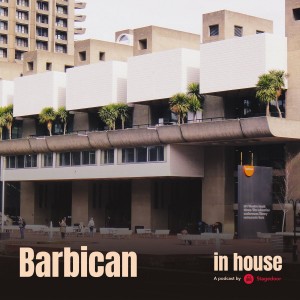 he 21st season of international drama and dance at the Barbican Centre to include Cillian Murphy in Enda Walsh’s adaptation of Max Porter’s Grief is the Thing with Feather from March 25, opens March 28, runs to April 13, & Ivo van Hove’s production of The Damned from the Comedie-Francaise, running from June 19-25. Other highlights include Simon Stone directing his own version of Euripides’s Medea, in production for Internationaal Theater Amsterdam (Toneelgroep Amsterdam), from March 6-9; and Ursula Martinez returning with the premiere of A Family Outing: 20 Years On, from March 27-30. In a podcast as part of Stagedoor’s In House series, I talk to Toni Racklin, head of theatre and dance at the Barbican, about the new season and also about its unique place in London’s theatrical ecology. You can listen here: https://stagedoorapp.com/in-house-podcast
he 21st season of international drama and dance at the Barbican Centre to include Cillian Murphy in Enda Walsh’s adaptation of Max Porter’s Grief is the Thing with Feather from March 25, opens March 28, runs to April 13, & Ivo van Hove’s production of The Damned from the Comedie-Francaise, running from June 19-25. Other highlights include Simon Stone directing his own version of Euripides’s Medea, in production for Internationaal Theater Amsterdam (Toneelgroep Amsterdam), from March 6-9; and Ursula Martinez returning with the premiere of A Family Outing: 20 Years On, from March 27-30. In a podcast as part of Stagedoor’s In House series, I talk to Toni Racklin, head of theatre and dance at the Barbican, about the new season and also about its unique place in London’s theatrical ecology. You can listen here: https://stagedoorapp.com/in-house-podcast
* Laura Linney to reprise My Name is Lucy Barton at The Bridge Theatre for 26 performances from January 23-February 16; I missed it last time, so mustn’t this time! Also at the Bridge: Joanne Froggatt and Robert Glenister are to appear in the premiere of Lucinda Coxon’s Alys, Always, based on the novel by Harriet Lane, to be directed by Nicholas Hytner from February 25, prior to opening on March 5 for run to March 30. And Nicholas Hytner is to direct an immersive production of A Midsummer Night’s from June 3, prior to opening on June 11, runs to Aug 31, with same creative team as his promenade Julius Caesarincluding designer Bunny Christie.
* Only Fools and Horses, a new musical based on the long-running TV sitcom that ran for a decade from 1981 to 1991 and then beyond it for Christmas specials up to 2003, will begin performances at the Theatre Haymarket from February 9, prior to an official opening on February 19. Written by written by comedian Paul Whitehouse (who will also star as Grandad in the show) and Jim Sullivan, the son of the show’s original creator John Sullivan, it will feature additional music by Chas Hodges, from Chas and Dave. The cast will also feature Tom Bennett as Del Boy and Ryan Hutton as Rodney, originally played on TV by David Jason and Nicholas Lyndhurst respectively, with Dianne Pilkington as Del Boy’s girlfriend Raquel.
*  Eugenius!, which had previously announced a transfer from the Other Palace (where it closes its second extended run on October 21) to the Ambassadors, has now cancelled that transfer, after an investor pulled out. Producer Kevin Wood said in a statement, “The past few days has been spent frantically trying to replace them but time has run out. In the New Year we will take stock and come again. We have spent too much time and money on this project to just let it die.”
Eugenius!, which had previously announced a transfer from the Other Palace (where it closes its second extended run on October 21) to the Ambassadors, has now cancelled that transfer, after an investor pulled out. Producer Kevin Wood said in a statement, “The past few days has been spent frantically trying to replace them but time has run out. In the New Year we will take stock and come again. We have spent too much time and money on this project to just let it die.”
* The Almeida’s production of Anne Washburn’s The Twilight Zone, based on the American TV series of the same name, will transfer to the Ambassadors, beginning performances from March 4. In a press statement, Rupert Goold (who runs the Almeida) commented, “Half of the people who booked to see The Twilight Zone at the Almeida were visiting our theatre for the first time so it feels hugely exciting to be giving new audiences another chance to catch this extraordinary, wildly entertaining creation from Anne Washburn and (director) Richard Jones.”
* Save-the-date: Next year’s Olivier Awards are to be held at the Royal Albert Hall on Sunday April 7. Michael Jibson makes the announcement in character as George III in Hamilton (which won him an Olivier last year!) here: https://twitter.com/OlivierAwards/status/1050704677871001600
LONDON THEATRE NEWS: BEHIND-THE-SCENES
 David Jubb (pictured right) is to step aside from BAC in April 2019, after some 20 years associated with the arts centre, first joining as development producer in 1999 before becoming artistic director and chief executive in 2004. Announcing his departure, he said it was the to “bugger off an dlet someone else have a go,” adding, “It’s a very special organisation with a great history and an exceptional community. I will carry with me the generosity, love, kindness, creativity and sheer remarkableness of so many people, over the years.”
David Jubb (pictured right) is to step aside from BAC in April 2019, after some 20 years associated with the arts centre, first joining as development producer in 1999 before becoming artistic director and chief executive in 2004. Announcing his departure, he said it was the to “bugger off an dlet someone else have a go,” adding, “It’s a very special organisation with a great history and an exceptional community. I will carry with me the generosity, love, kindness, creativity and sheer remarkableness of so many people, over the years.”
NEW YORK NEWS
* Casting for US Broadway premiere of James Graham’s Ink at Samuel Friedman Theatre from April 2, opening April 24: Bertie Carvel to reprise his Almeida performance as Rupert Murdoch, with Jonny Lee Miller as Larry Lamb, first editor ofThe Sun, in Rupert Goold’s production.
*  The UK YouTube pop star Conor Maynard (pictured right) is to join Broadway company of Kinky Boots from November 20 to January 10, playing Charlie Price. He has stated, “I’ve always truly admired the talent that performers on Broadway possess and performing alongside them is going to be a real challenge.
The UK YouTube pop star Conor Maynard (pictured right) is to join Broadway company of Kinky Boots from November 20 to January 10, playing Charlie Price. He has stated, “I’ve always truly admired the talent that performers on Broadway possess and performing alongside them is going to be a real challenge.
FAREWELL
* Carol Hall, one of only a handful of female composers to have had their work produced on Broadway which included the score to the 1978 hit musical The Best Little Whorehouse in Texas (and its far-shorter lived sequel The Best Little Whorehouse Goes Public in 1994), has died, aged 82. Her New York Times obituary is here.
INTERVIEW OF THE WEEK
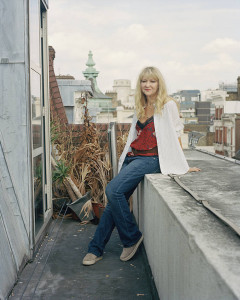 Producer Sonia Friedman, interviewed in the FT’s Magazine on October 6:
Producer Sonia Friedman, interviewed in the FT’s Magazine on October 6:
* On the significance of producing The Jungle at the Playhouse:
“The Jungle is a defining moment in my career because I don’t think I could produce it in the West End now if I hadn’t had the 20 years of experience behind me. I’ve got to the place professionally where I can say, ‘Let’s do this’: convince the theatre owner, convince investors, convince artists to do it in that space. It’s a defining moment for me because if I can’t do that type of work alongside all the rest of it, I don’t want to do my job. I have to be able to tell those stories too.”
* On not wanting to be labelled a commercial producer: “Nothing I do sets out to be commercial. I’ve had an allergy towards that word since I worked in the subsidised sector. I hated commercial theatre. I think it’s anti-art, anti-theatre, anti-creativity, anti-audience, and so I like to think of myself as an independent producer as opposed to a commercial producer.”
* On her debt to her mother, who recently died:
“Losing my mum has crystallised for me everything to do with the absent father and actually who I was really doing it for. I was actually really doing it for my mum. Because my mum had such a difficult time: four children under 10, on her own, no money, rejection from my father’s side completely. He had multiple affairs and he didn’t ever give her a penny. And she put her whole career on hold, her life on hold. I thought I was doing it for my dad. I wasn’t. I was doing it to prove to mum that it was worth it.”
* What the loss of her mother means to her:
“When I saw Harry Potter just after my mum died, up until that point, the play had been about one thing for me. And then I saw it again and it became a completely different play to me. Before, it was a play about father-son issues, parent-children issues, how you communicate. And then after, it was a play about grief and loss, and that’s what it is to me now. Because I am a girl who is grieving and has lost. So that will no doubt inform how I move forward creatively… Yes, I lost my dad, but I didn’t grieve. That was anger. So we’ll see how it affects the next period of my working life.”
* On more women in the theatre:
“In terms of female directors, female-led plays, female writers — this is the shift. It’s certainly, in our lifetime, the biggest shift and the most exciting thing I’ve ever seen, happening right now. I think we are now seizing the moment and I can’t see it going backwards.”
On working on Broadway:
“Literally every time I open a show on Broadway I go, ‘I don’t know why I’m doing this to myself. What am I doing?’ But Broadway is the best place to produce in the world because of the high-wire act. It’s intoxicating. It’s devastating when it doesn’t work but, my God, when it does it just feels like you’ve conquered the world.”
On critics: “The critics are very, very important but the critics can’t make it a hit if the people don’t want to go. You can’t have a hit if the audience and the word-of-mouth is not strong. But if they happen together you’re off and running.”
On star casting: ”There’s no question that audiences love star performances. It’s what the theatre’s always been about. I think some producers are sometimes criticised for casting stars when actually they’re terrific theatre actors who happen to be famous for doing Sherlock. I’d be lying if I didn’t say that if a star is in a play, that is going to make my life easier. But I just want to be clear that we understand what the word star means. A star is a great actor that audiences may have heard of.”
And the ultimate challenge of the theatre: ”The world I’ve chosen to work in, nobody really knows the answer as to why something does or doesn’t work. So I think what keeps me going is the fact that I don’t know what the result is going to be, and I need to go through it in order to find out. I’m not a coward, you see. I’m really, really excited by the unknown.”
TWEET OF THE WEEK
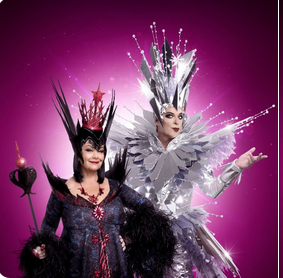 Matthew Amer tweeted this photograph (right). saying: “Can we all take a second to enjoy the costumes that could impale an unsuspecting company member”, to which Julian Clary replied, “I’m determined not to impale a chorus boy during the run, I promise.”
Matthew Amer tweeted this photograph (right). saying: “Can we all take a second to enjoy the costumes that could impale an unsuspecting company member”, to which Julian Clary replied, “I’m determined not to impale a chorus boy during the run, I promise.”

